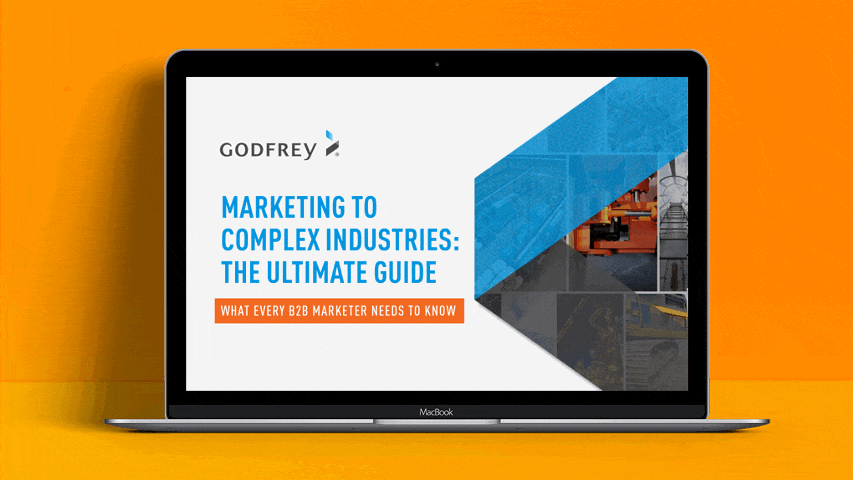The Future of Search: 5 Trends Reshaping SEO & How To Stay Ahead

How can your B2B business stay on top of the ever-evolving search landscape? As AI platforms like ChatGPT continue to influence how we search, it’s more critical than ever to stay ahead of the curve. In this post, we’ll explore 5 key trends shaping the future of search and 4 immediate actions you can take right now to help your business be more easily found on both Google and AI-driven platforms.
1. Google Is Still the 800-Pound Gorilla & They’re Fighting To Keep Up
For two decades, Google has been the dominant search engine, with little competition from Bing, Yahoo or DuckDuckGo. Based on third-party data, Google still controls about 90% of the market share for search in all English-speaking countries.
However, now more than ever, Google has their back against the wall and is finally at serious risk of losing market share to other evolving platforms. Why?
- The Monopoly Trial & Ruling
In May 2024, following the biggest tech monopoly trial of the 21st century, the United States Government vs Google, a federal judge ruled that Google is officially a monopoly. This was the U.S. government’s first major monopoly case to go to trial in decades, and the first in the modern internet era. After deliberations, the judge announced the landmark decision and in the 277-page ruling stated that “Google’s search engine has been illegally exploiting its dominance to squash competition and stifle innovation.” Sentencing is scheduled for August 2025, and it’s uncertain what impact it will have. - Leaked Documents Reveal 14,000 Ranking Signals
In May 2024, leaked documents from an ex-Googler exposed nearly 14,000 ranking signals and specific factors that Google can use in ranking websites. Google confirmed the authenticity of the documents, which were only two months old. These documents contradict a number of statements the company made over the past two decades, including testimonies in front of Congress in the last 5 years. The leaks also revealed that Google had collected and used sensitive data from its Chrome browser and Google Analytics tracking platform. In addition to causing shockwaves throughout the SEO community, this has started to further erode both users’ and advertisers’ trust. - User Trust Shifts Toward Forums Like Reddit
Frustrated by the declining quality of Google’s search results, users have increasingly started appending “Reddit” to their queries in search of real-world answers to their questions. Google has taken notice of the quality concerns and not only mitigated risk by adding a “Forums” tab to the top of search results to allow you to filter down to websites like Reddit, but they’ve signed an annual $60 million agreement with Reddit, allowing them to pipe Reddit data directly into their platform via an API. As part of the agreement, Reddit is also allowing Google to leverage Reddit’s public content for training Google’s AI models. Tests have shown that new Reddit posts can even rank in just minutes.
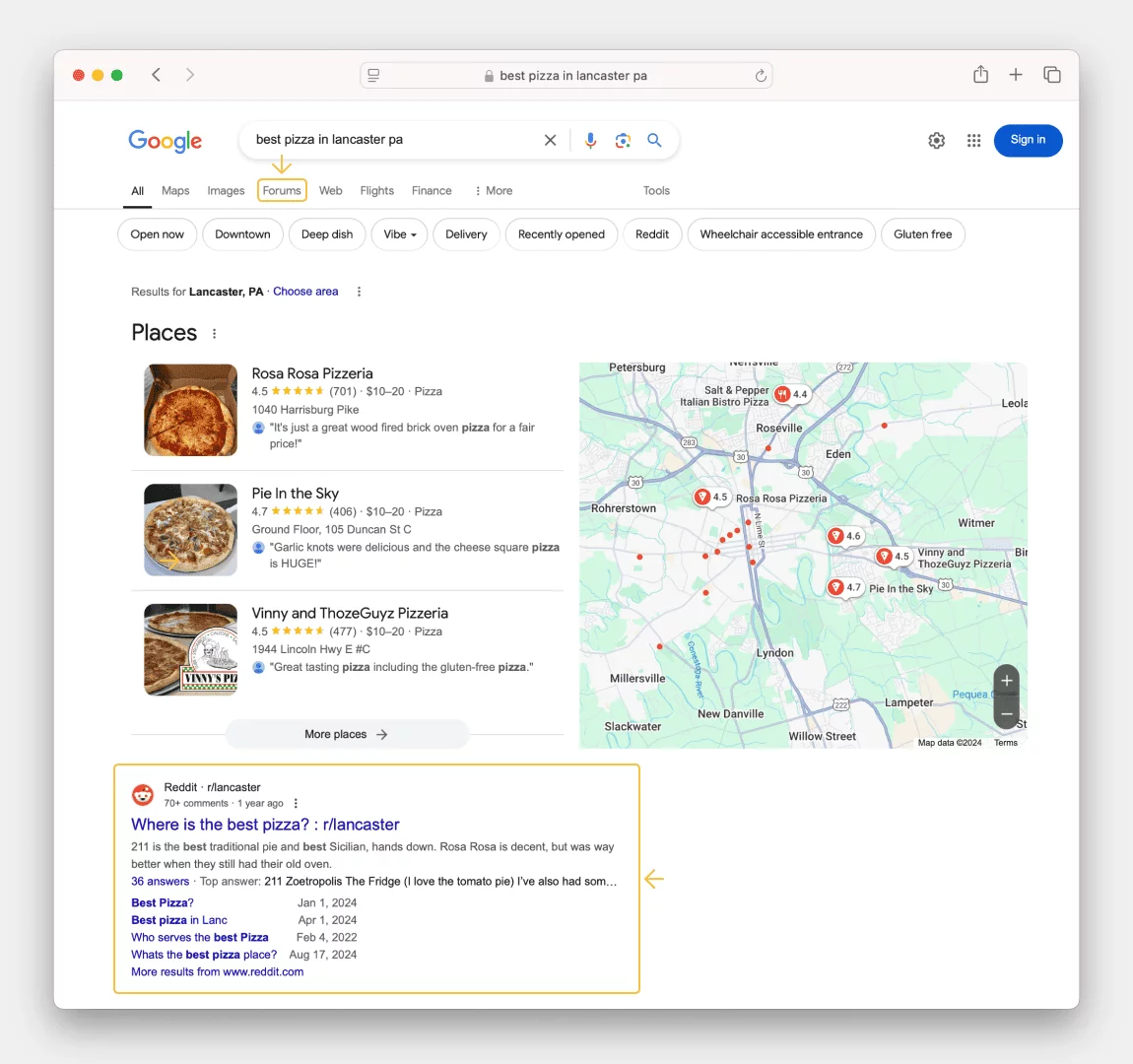
Google actually tried to buy Reddit back in 2005, proposing to use it to power the comments sections on Google properties. While Reddit’s founders declined the offer because they didn't want to become “Googlers,” it highlights Google’s long-standing strategy of acquiring or controlling platforms that could threaten its dominance in search. As a result, Google later launched Google+, a social media platform that failed and was ultimately sunset in 2019.
Reddit went public in March 2024, valued at $9B, and has since become a key source of real-world answers for users seeking alternatives to Google’s traditional search results. If Google overcomes its monopoly lawsuit, they could attempt to take a stake in Reddit — though this would undoubtedly raise regulatory concerns and worsen their antitrust challenges.
2. Google Has Leveraged AI in Search for 5+ Years
What many people might not know is that Google has been using AI in their organic algorithm for years. During Google’s testimony before Congress in 2020, an executive revealed that Google’s index contains over 400 billion pages and documents — a number that has likely grown significantly since then.
Nearly 5.9 million searches happen every minute, totaling 8.5 billion searches per day. Of those searches, Google claims that about 15% of those searches are for things that no one has ever typed into Google before. To address this, they’ve leveraged AI to process billions of pages and distill them down into only a handful of results that might be most relevant and informative to the user. User behavior and how they engage with these search results feed back into Google's AI models, continuously refining search quality.
However, what’s happening next is the real trend to watch. When OpenAI launched ChatGPT in 2023, it ignited an AI arms race, pushing major companies like Google to roll out AI features that were half-baked. One of those rushed releases was the launch of Google’s AI chatbot platform Bard, which was designed to compete against ChatGPT. However, Bard struggled to gain traction, and in February 2024 Google rebranded the product — renaming it Gemini. Despite heavy promotion, adoption rates remain low.
Meanwhile, in May 2023, Google rolled out generative AI features within the search results. Through Google Search Labs, Godfrey was an early tester of these features, experimenting with them before they were available to everyone. From our testing, we’ve experienced that the information surfaced in AI Overviews is often just repetitive snippets pulled from other website pages, with sources cited beneath — essentially duplicating information already present lower on the page.
And unfortunately, sometimes the information that is provided is just plain wrong — like how long it takes to cook filet mignon on the grill. Whether you like it rare or well done, that’s easy — it’s simply 2-3 minutes per side!
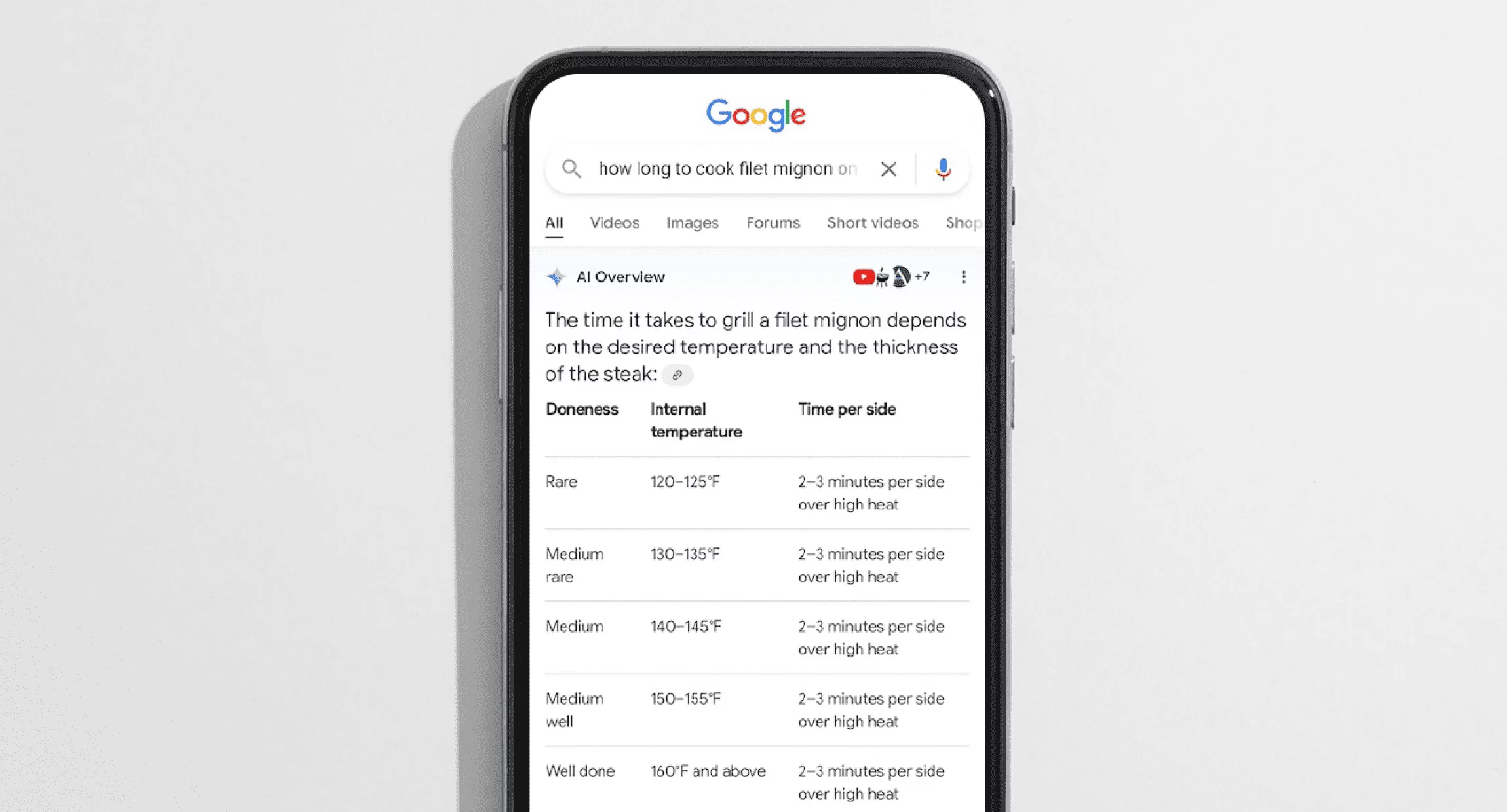
Many wish Google search could just go back to the way it was before all of the noise. That’s unlikely to fully change, but after constantly hearing this feedback, Google added a “Web” filter in May 2024, allowing users to filter down to only text-based webpage links — without ads. It’s tucked away in the navigation under the “More” drop-down, but once clicked and enabled, that will allow you to see search results like they were years ago — and ensure you’re cooking steaks to your personal perfection.
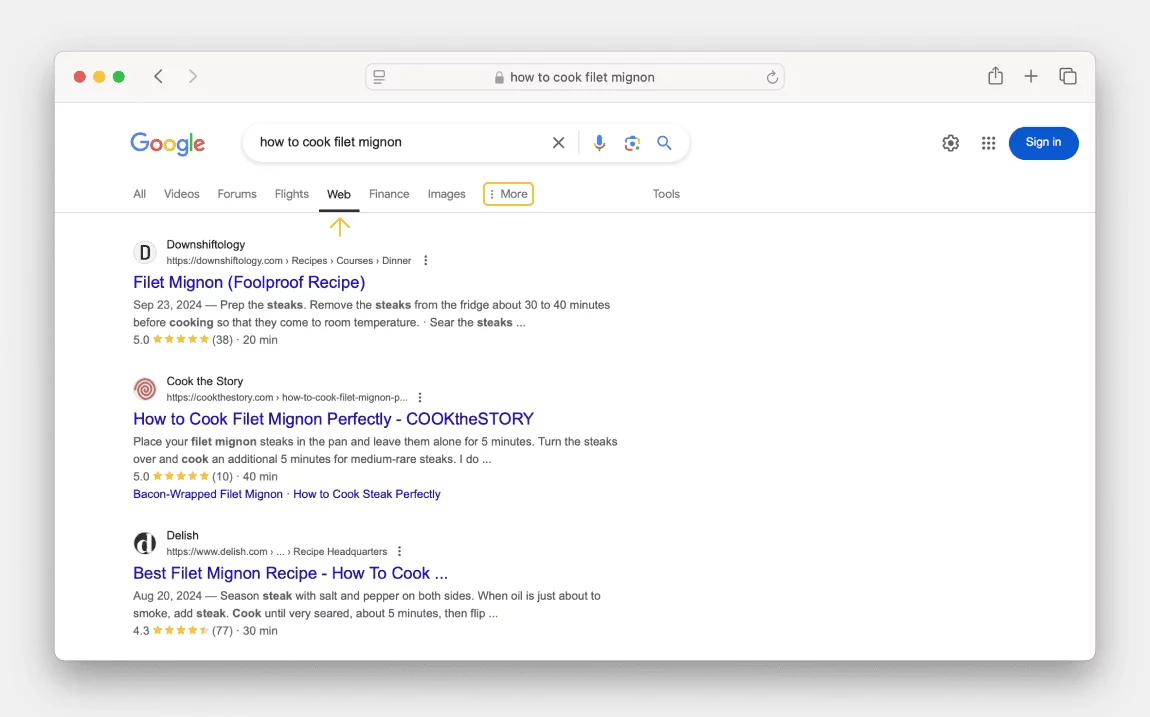
These developments will continue to transform how users experience search, and companies must pay close attention to how AI-driven results will continue to evolve.
3. ChatGPT & the Resurgence of Bing
In February 2023, Microsoft signed a multiyear billion-dollar contract to embed ChatGPT’s functionality into Bing’s search results. This is significant because Microsoft ships new desktop computers and laptops with Microsoft Edge as the default internet browser and Bing is set as the default search engine. Unlike its predecessor, Edge hasn’t faced as many performance issues, so many users don’t bother changing the default browser or search engine.
As a result, Bing has slowly started to regain market share on desktop again, growing from 8.6% to 12% of all desktop users worldwide. This resurgence, combined with the integration of ChatGPT’s advanced conversational capabilities, positions Bing as a real contender in the search engine landscape — especially as users seek more AI-enhanced experiences.
OpenAI also just launched ChatGPT search. They claim that ChatGPT search will provide a new way to search, as “getting answers on the web can take a lot of effort, often requiring multiple attempts to get relevant results.” By enhancing the conversational capabilities of their existing models with real-time information from the web, they claim this will help finding what you’re looking for be faster and easier. Time will tell if ChatGPT, through Bing or ChatGPT search, can become a true competitor — and possibly even a replacement for Google.
4. Despite AI Growth, Google Is Not Declining
But as of now, despite the explosion of artificial intelligence, data shows that AI is not disrupting search in a way that impacts Google’s dominance — at least, not yet. Rand Fishkin from SparkToro recently shared details from a large-scale study just conducted by Sonata Insights and Datos. Their research shows that desktop users aren’t leaving Google in favor of ChatGPT or other AI platforms; if anything, they’re using both platforms together.
The study, which analyzed anonymous clickstream data from millions of users, found that Google is still used 11 times more frequently than ChatGPT by the same cohort of users. The graph below illustrates this trend, showing that, while AI is growing, Google remains the preferred tool for most users:
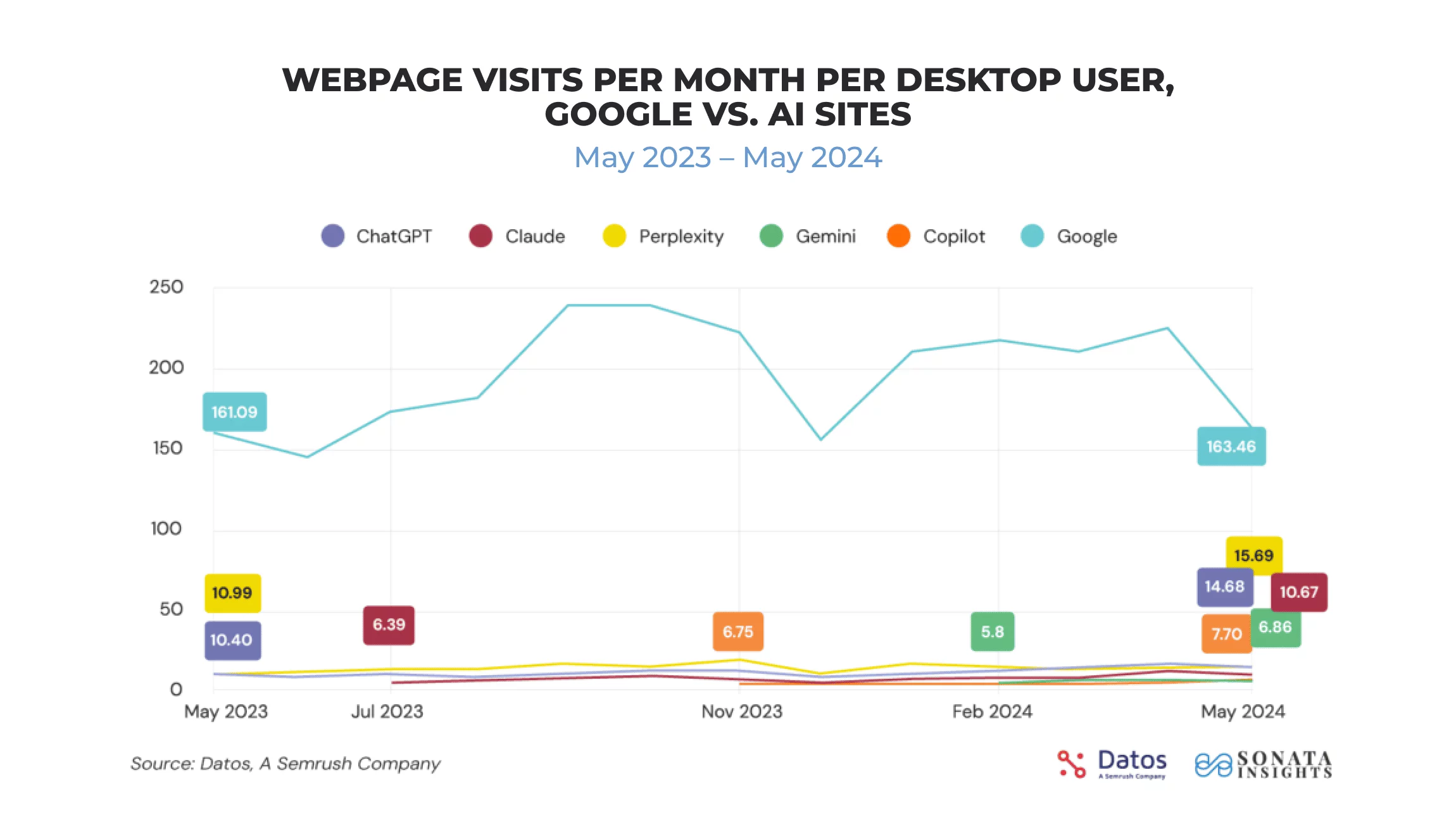
Source: Datos
Additionally, the percentage of traditional search engine users who also use AI platforms has only grown by 2 percentage points in the past year — with only 16% of the data cohort using one of the AI platforms in the study (ChatGPT, Claude, Perplexity, Gemini and Copilot).
Most notably, AI platform users haven’t stopped leveraging traditional search engines, with 99% of those users still relying on Google, Bing and DuckDuckGo.
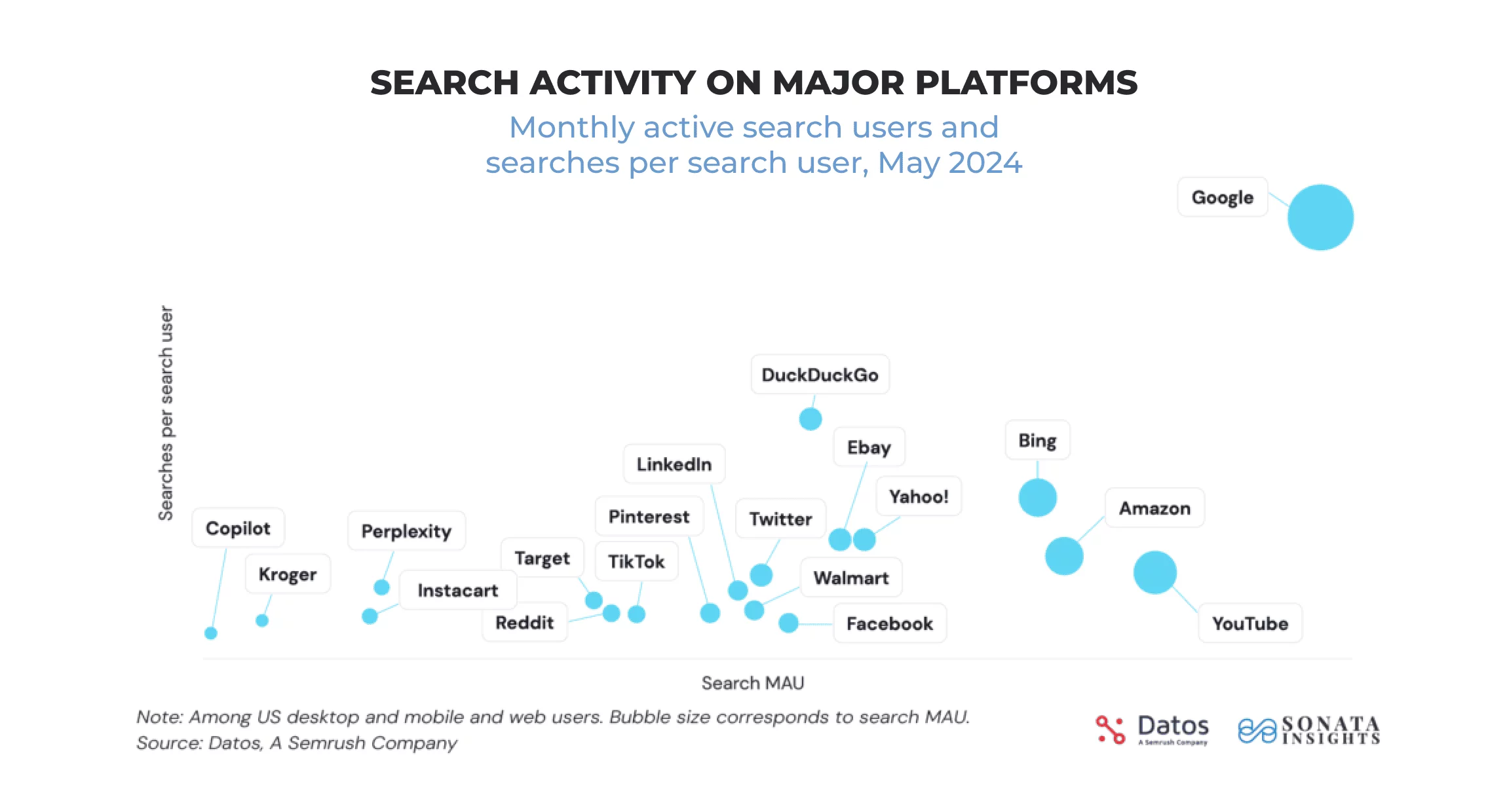
Source: Datos
While AI continues to grow, many marketers believe search patterns have already shifted, when in reality this shift hasn’t happened yet. The data shows that users are supplementing their search habits with AI rather than replacing traditional search engines. For businesses, traditional search optimization remains as critical as ever, while keeping an eye on AI tools will provide a competitive edge.
5. Reddit Signed an Agreement With OpenAI
In May 2024, Reddit and OpenAI announced they signed a formal partnership to allow Reddit content to be used as training data for OpenAI’s large language models. Additionally, Open AI would become a Reddit advertising partner.
This is important for several reasons:
- What others are saying about your company on Reddit could be leveraged as part of the data that fuels AI-generated responses, like those from ChatGPT.
- While neither company has elaborated on what OpenAI becoming an official advertising partner means, it could signal that ChatGPT may start showing ads within their platform — potentially leveraging Reddit’s ad platform to serve up ads to users that don’t have paid accounts. This move could divert ad revenue away from Google, whose primary revenue stream comes from Google Ads. Google will likely fight hard to retain its position as a dominant player in digital advertising.
- Historically, Reddit has not been a typical B2B marketing channel, but this partnership may create new opportunities for B2B marketers to rethink their approach and tap into this growing space.
As Reddit and OpenAI continue to evolve their partnership, it’s crucial for businesses to monitor these developments closely. The shifting advertising landscape and the growing influence of AI-driven content could provide both new opportunities and competitive threats.
What Can You Do Right Now?
Here are 4 ways you can take immediate action to help ensure the best information about your business is being surfaced in both traditional search engines and AI platforms like ChatGPT.
1. Fix Your Website’s Visibility in Search Engines & ChatGPT
While there are hundreds of signals that Google and other search engines use to determine search results, it ultimately boils down to the value of information on your website and what others are saying about you online.
While there may be other factors at play, like how often questions are asked about your brand, AI platforms like ChatGPT will utilize these same principles. It’s critically important that the content available on your website adds value and incorporates relevant keywords that people might search for when looking for information about your company.
There are a few ways to do this:
- Audit Your Website’s SEO: Use tools like Semrush or Ahrefs to determine how well your website ranks in Google for your important keywords and how often users are actually searching for those keywords on a monthly basis.
- Investigate Your AI Presence: Simply ask ChatGPT questions related to your industry or company name directly and see what information it returns and if it mentions your company in its responses.
- Run a Visibility Report: Platforms are also releasing new features and functionality to scan how visible your brand is in ChatGPT. You can enter your brand and run a free report using HubSpot's AI Search Grader to find strengths and weaknesses, sentiment and share of voice of your brand in ChatGPT’s 4o model. It’s currently limited to ChatGPT and will hopefully be expanded to include other AI platforms like Perplexity and Claude. It’s not perfect, but it's a starting point.
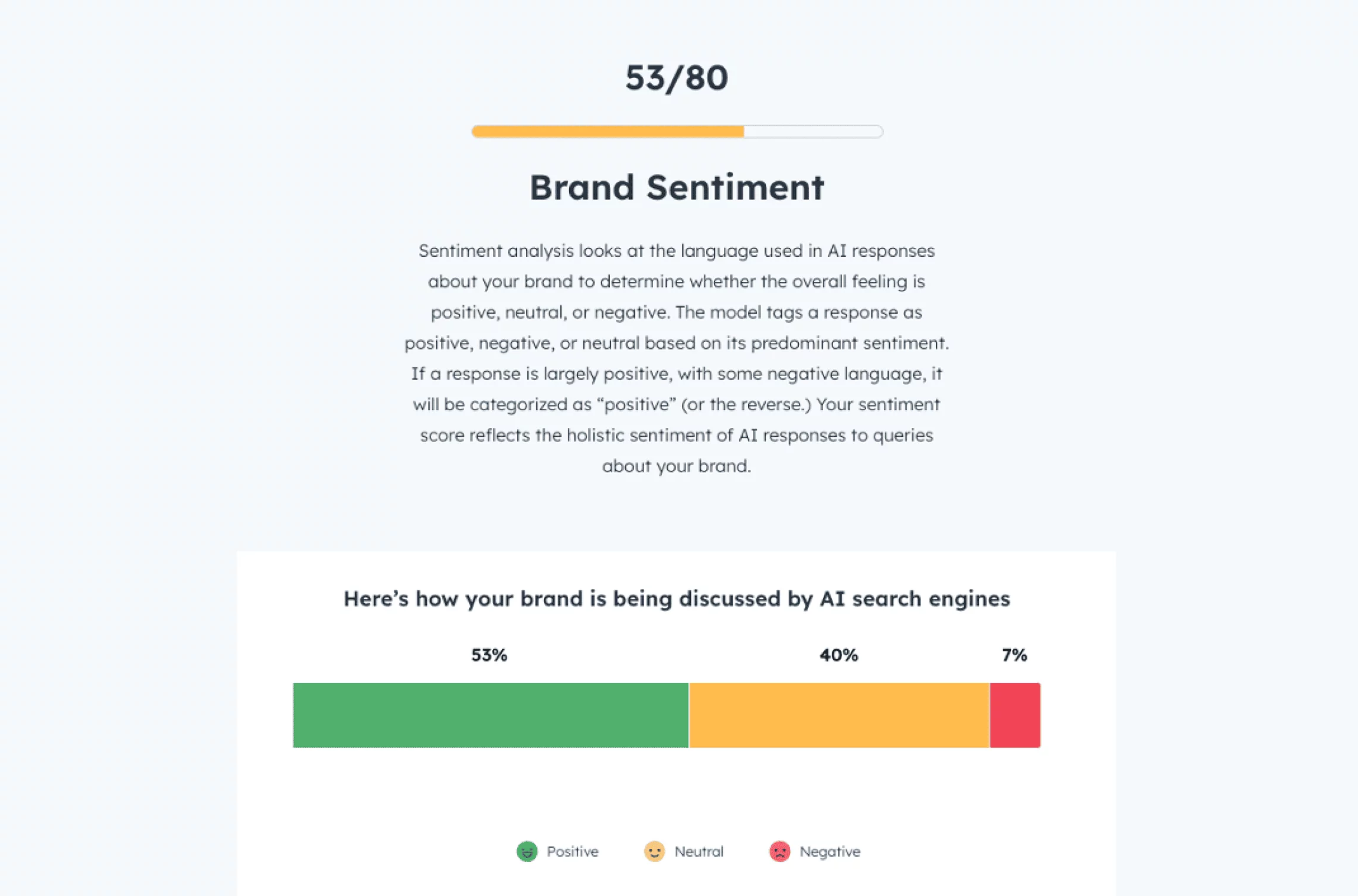
You can use this information to find content gaps and where there are opportunities to improve your website and your online reputation.
2. Increase Backlinks to Your Website
What others are saying about your company on third-party websites is just as important as it was a decade ago. The SEO tools refer to this as Domain Authority, and here are a few ways to help improve that:
- Research Your Existing Backlinks: Do some research on the backlinks that exist for your website and top competitors. Your key competitors may not be your actual competition, unless they are ranking in the top positions for your keywords. Using a platform like Majestic can help you assess how your domain authority stacks up against the competition, and you can see where they are getting those links and what content is being promoted. Can you create something link-worthy that is 10 times better? Could you find an opportunity to pitch a new story to a publication where a competitor has a link and you don’t?
- Develop a PR & Outreach Strategy: Developing a PR strategy will help create opportunities to get valuable content on relevant websites with mentions of your brand and new links back to your website. Pitch guest posts or thought-leadership articles to authoritative industry publications and blogs to earn backlinks. Focus on creating high-quality, link-worthy content, such as e-books, white papers, infographics or unique data studies that other websites will want to cite. Content created should be educational and informative; it’s not a scenario to promote your company in a salesy way.
- Reclaim Unlinked Brand Mentions: Monitor how and where your brand is being mentioned online. If a site mentions your company without linking to your website, reach out to them and request a relevant backlink to a resourceful page. Instead of dropping a link to the homepage, you can provide one that’s related to the article and your target keywords. While search engines may understand that your company is semantically related, a link can certainly help. Keeping track of how your website is ranking for keywords will allow you to see if your efforts are moving the needle.
Increasing the quality and quantity of your backlinks can significantly help increase your website rankings on Google and better position your brand for evolving AI platforms.
3. Use Social Listening To Uncover & Address Negativity
Social platforms, including Reddit, can shape perceptions of your brand, which may now be influencing AI responses. Leveraging social listening tools can help you stay on top of public sentiment:
- Monitor Key Platforms: Use a social listening tool like Sprout Social that has the capabilities to monitor what users are saying about your brand(s) on Reddit and other social media platforms.
- Identify & Address Negative Feedback: Uncover negative posts or issues that can not only help find ways to improve your products or services but improve your customers’ perception and your reputation.
- Fuel Your Marketing Strategy: Insights from social listening can help fuel new content, PR and social media strategies to address concerns or issues being raised about your brand — not only on Reddit but across all channels.
4. Resolve Technical SEO Issues on Your Website
If Google and other search engines can't properly crawl, index and rank your website, then you likely will not see any value with ChatGPT or other AI platforms either. OpenAI scraped the web and is leveraging that data, just as Google does.
Not only is it important to include keywords on relevant pages and ensure there’s enough valuable content, but there are many technical factors behind the scenes that can make a big impact. Here are just a few ways to improve the overall technical health of your website:
- Improve Website Speed & Mobile-friendliness — Find out how fast your website loads using tools like Pingdom, Google’s PageSpeed Insights or GTmetrix and see what you can do to address any issues and increase the score.
- Ensure There’s a Seamless User Experience — The website structure, including the navigation, page layouts and how pages are internally linked, can make a big impact on the user experience and the individual customer journey. Using a tool like Hotjar, you can understand how users are navigating through the website, allowing you to put yourself in your customers’ shoes and watch their full interaction with your site. Develop a list of action items by watching for consistent problems and seeing where users are leaving your website.
- Optimize Meta Data — Each page on the website contains valuable meta data, which users don’t necessarily see but Google and other search engines use. That includes title tags and meta descriptions, which do show up in the search results, as well as image alt tags, which are brief descriptions of what the image is. The information across the website should be unique, follow standardized character count limits, and be optimized for each page. Often, we see websites having the same title tag and meta description across the entire site, which can ding your overall rankings and is one less signal to search engines for what each page is about.
- Identify & Eliminate Duplicate Content — Duplicate content found across multiple pages on your site or on third-party websites can negatively impact overall SEO performance. Tools like Screaming Frog and Copyscape can scan your website content to identify scenarios where content might have been duplicated or even stolen. Address any issues and ensure new content being added to your website is unique and adds value.
- Configure Sitemap.xml & Robots.txt Files — These technical elements behind the scenes allow search engines to understand all of the pages on your website, provide guidance on which may have more importance, and can help block pages from being crawled and indexed. Getting these properly configured will provide one more positive signal to search engines.
- Fix Broken Links — If you’ve ever experienced issues viewing a page, downloading an e-book or watching a video and you get a 404 Page Not Found error message, you know how frustrating that can be. That’s not helpful for your users or search engines. Tracking down pages that contain broken links or missing images/videos and making updates on your website to fix the links or remove the reference will ensure users can find the information that they’re looking for on your site.

Google has long been the dominant force in search, but the landscape is shifting rapidly. For the first time in their 20-year history, Google faces the possibility of being dethroned. Now more than ever, it’s crucial to ensure your website is fully optimized for search engines and that your online presence is continually evolving to keep pace with these changes.
There are many components and complexities in ranking well in search engines, and that’s where Godfrey can help. Contact us today to find out how we can enhance your search visibility and ensure your brand is well-positioned for the future of search.
Matt Boaman - Vice President, Marketing Channels
Matt’s digital expertise and results-oriented approach has helped advance clients' digital program performance. In his role as vice president of marketing channels, he leads the digital, public relations and media teams.




